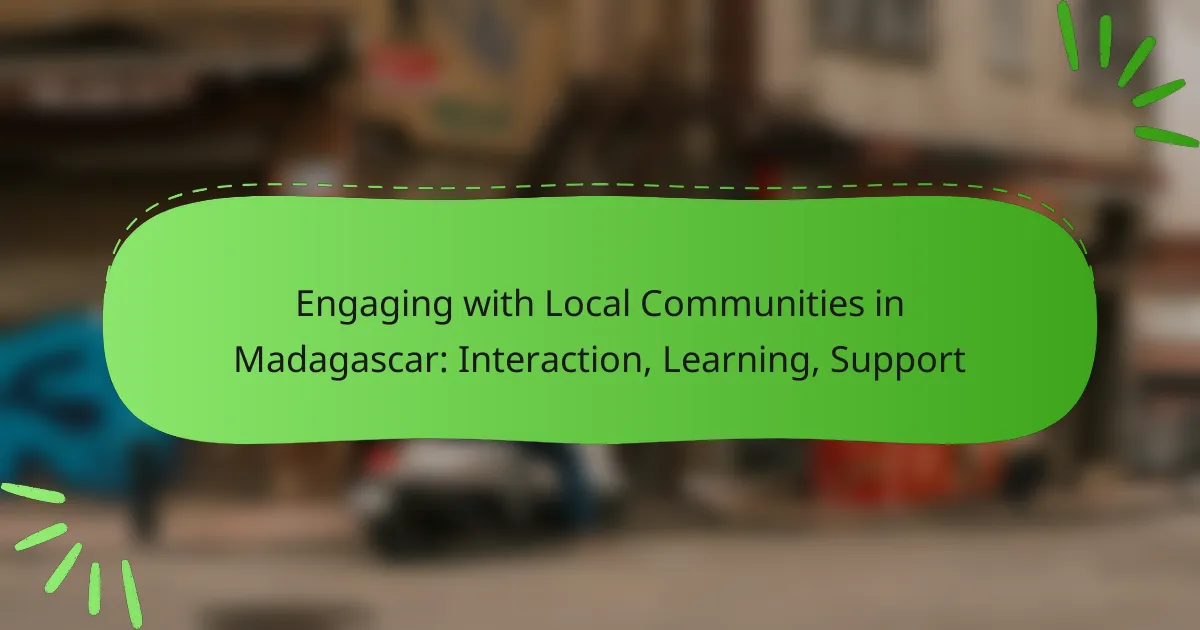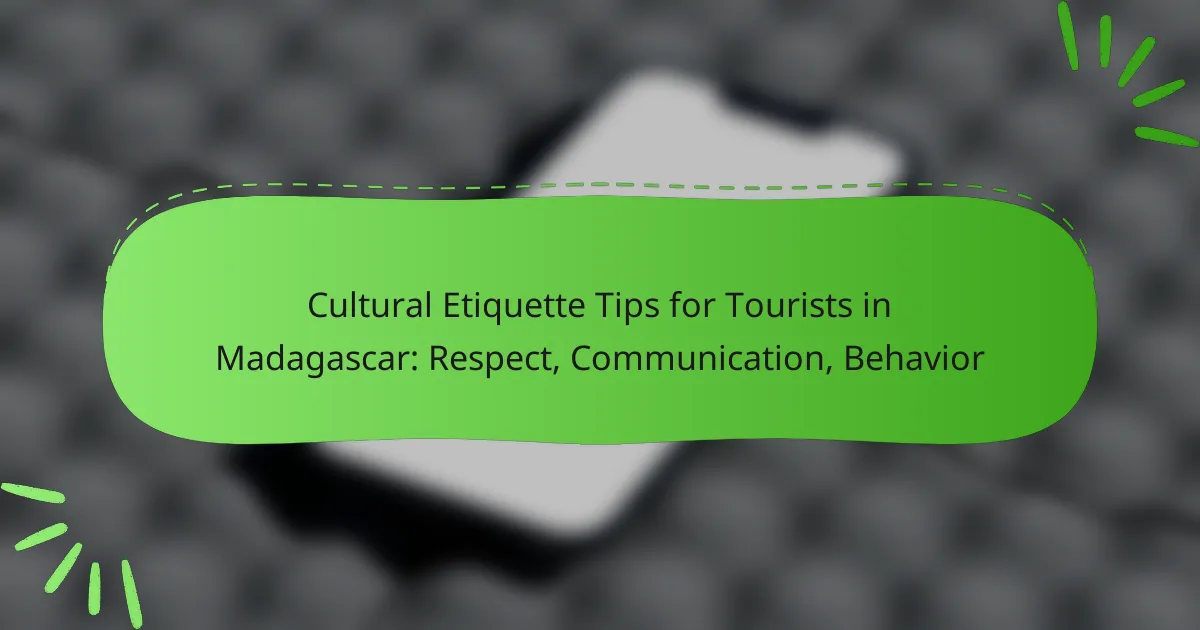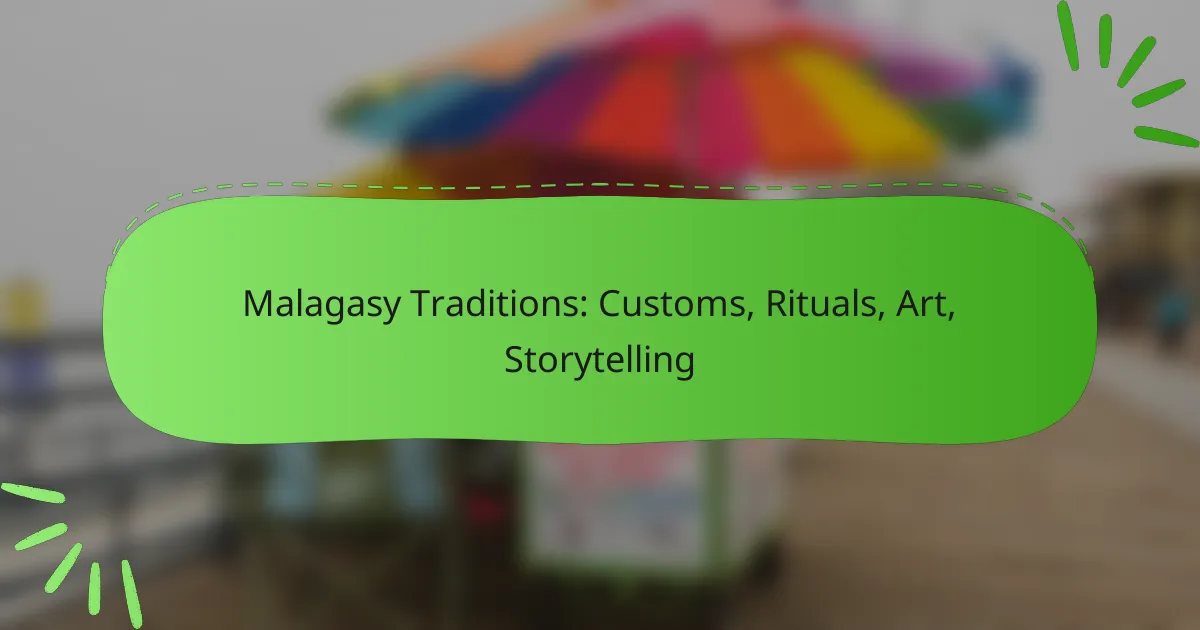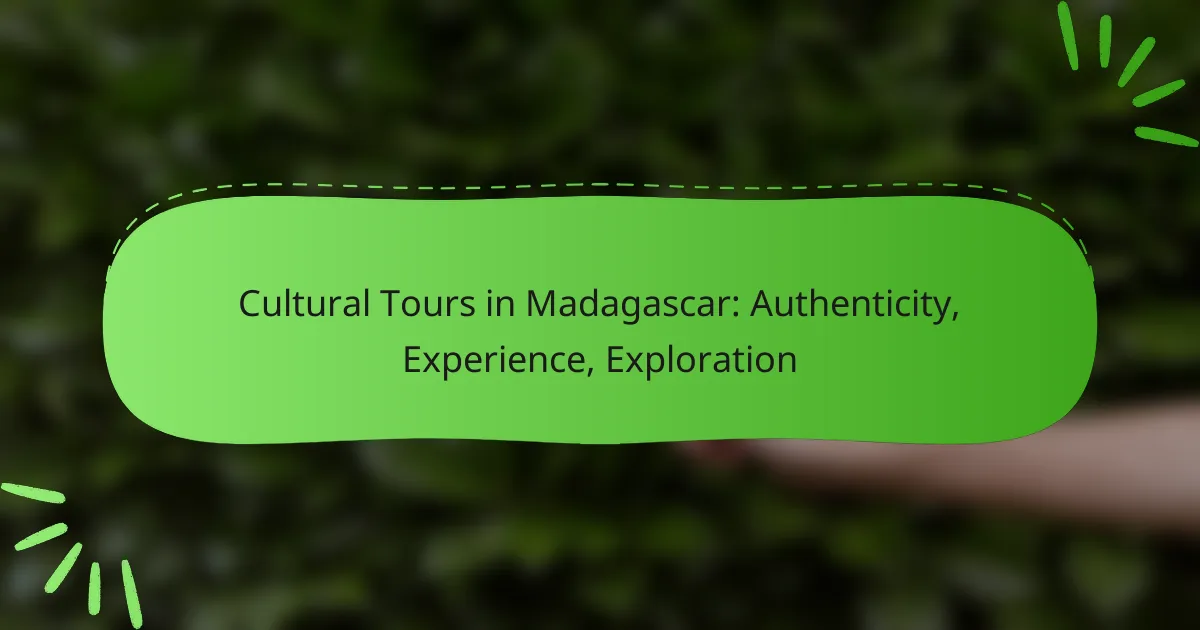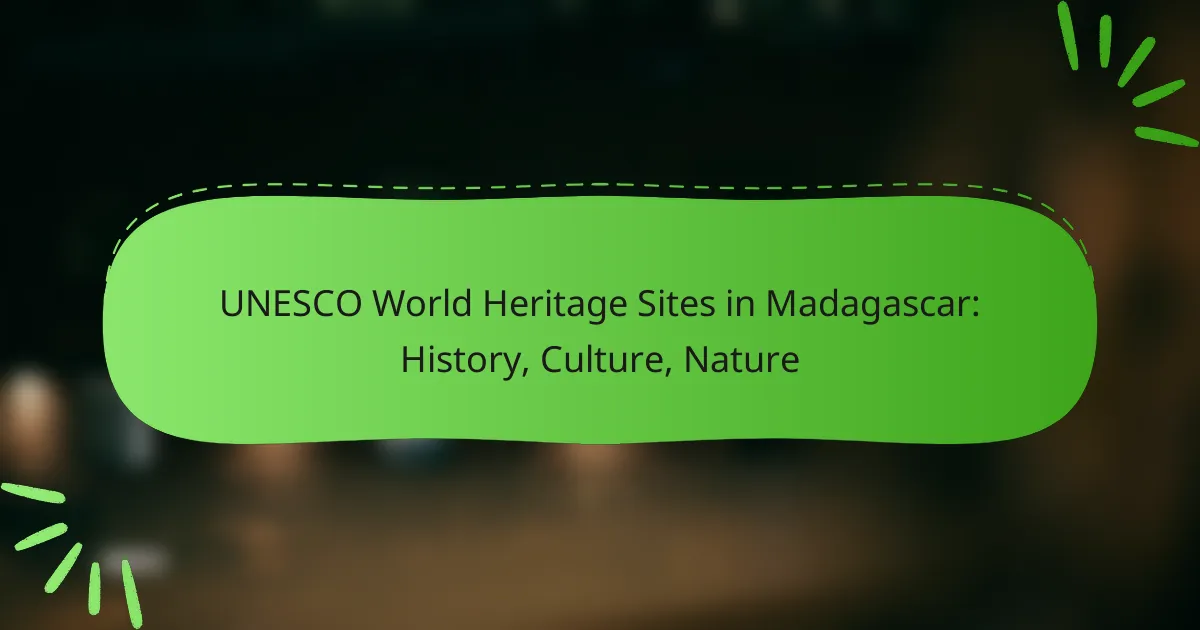Engaging with local communities in Madagascar is a dynamic process that emphasizes active participation, cultural exchange, and mutual support. By attending local events, volunteering, and backing small businesses, individuals can foster meaningful connections and gain valuable insights into the rich traditions and practices of the Malagasy people. This engagement not only enhances personal understanding but also contributes to the overall well-being of the communities involved.
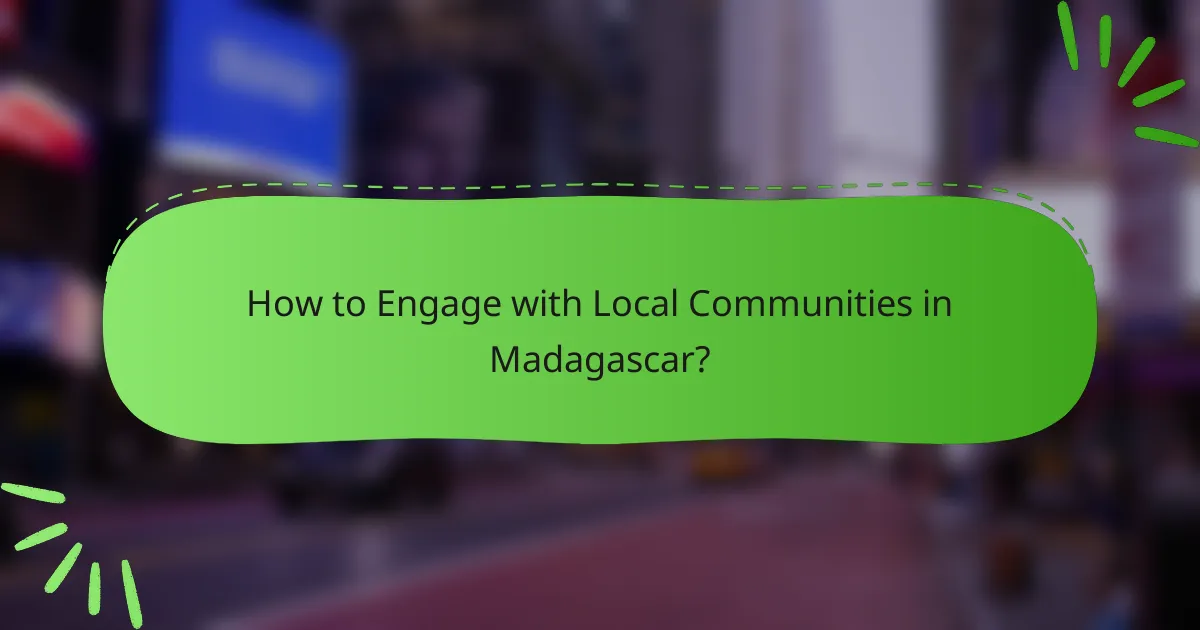
How to Engage with Local Communities in Madagascar?
Engaging with local communities in Madagascar involves active participation, support, and learning from the people and their culture. This can be achieved through various means such as attending events, volunteering, and supporting local businesses.
Participate in community events
Joining community events is a great way to connect with locals and understand their traditions. Look for festivals, markets, or cultural gatherings that showcase Malagasy music, dance, and cuisine.
These events often welcome visitors and provide opportunities to interact with residents. Engaging in local customs can enhance your experience and foster relationships within the community.
Volunteer with local NGOs
Volunteering with non-governmental organizations (NGOs) allows you to contribute to meaningful projects while immersing yourself in local life. Many NGOs focus on education, health, and environmental conservation, offering various roles for volunteers.
Before committing, research organizations to ensure they align with your values and goals. Consider the time commitment and the impact of your work on the community to make a positive contribution.
Support local artisans and businesses
Supporting local artisans and businesses is crucial for the economic sustainability of communities in Madagascar. Purchase handmade crafts, textiles, and food products directly from local markets or cooperatives.
By choosing to buy locally, you help preserve traditional crafts and provide fair income to artisans. Look for products that reflect the unique culture of Madagascar, ensuring your purchases benefit the community directly.
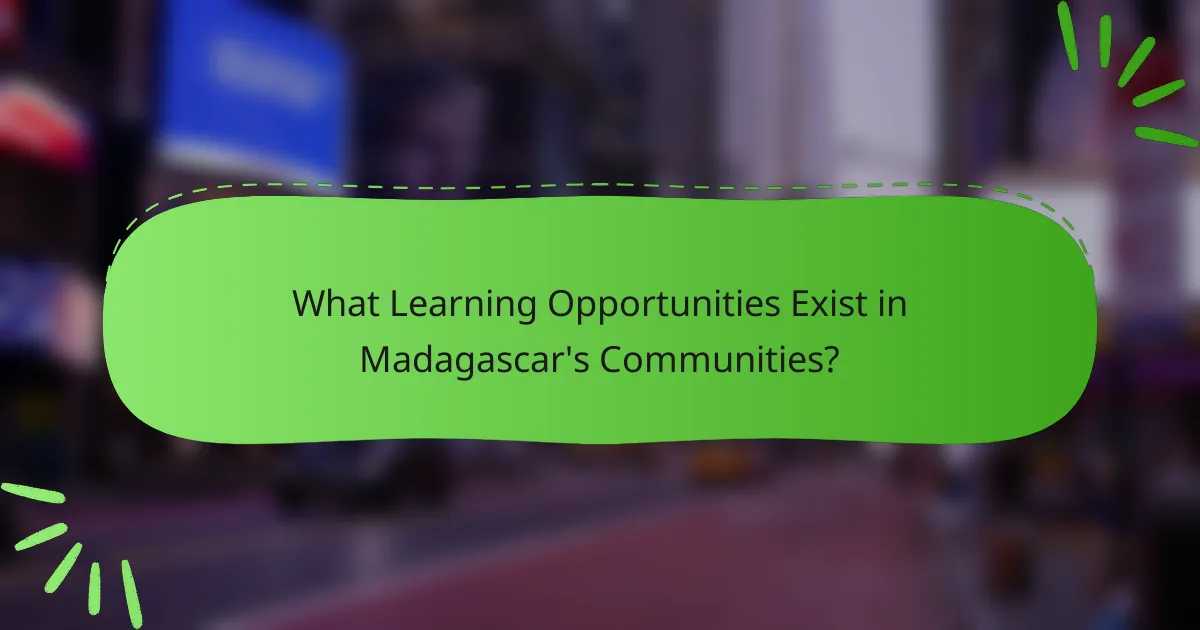
What Learning Opportunities Exist in Madagascar’s Communities?
Madagascar’s communities offer a variety of learning opportunities that foster cultural understanding and skill development. Engaging with local residents through programs and workshops can enhance knowledge of traditional practices and languages.
Cultural exchange programs
Cultural exchange programs in Madagascar allow participants to immerse themselves in local traditions and lifestyles. These programs often involve homestays, where visitors live with Malagasy families, gaining firsthand experience of daily life and customs.
Participants typically engage in community activities, such as festivals or local markets, which provide insight into the rich cultural heritage of Madagascar. These experiences can range from a few weeks to several months, depending on the program’s structure.
Workshops on traditional crafts
Workshops on traditional crafts are a popular way to learn about Madagascar’s artisanal skills, such as weaving, pottery, and wood carving. These hands-on sessions are often led by local artisans who share their techniques and cultural significance.
These workshops can last from a few hours to several days, allowing participants to create their own crafts while gaining appreciation for the artistry involved. Engaging in such activities supports local economies and helps preserve traditional crafts.
Language immersion courses
Language immersion courses in Madagascar focus on teaching Malagasy, the national language, through interactive methods. These courses often take place in community settings, where learners practice speaking with native speakers.
Typically ranging from a few days to several weeks, these courses emphasize conversational skills and cultural context. Participants should expect to learn basic vocabulary and phrases that are essential for daily interactions, enhancing their overall experience in Madagascar.
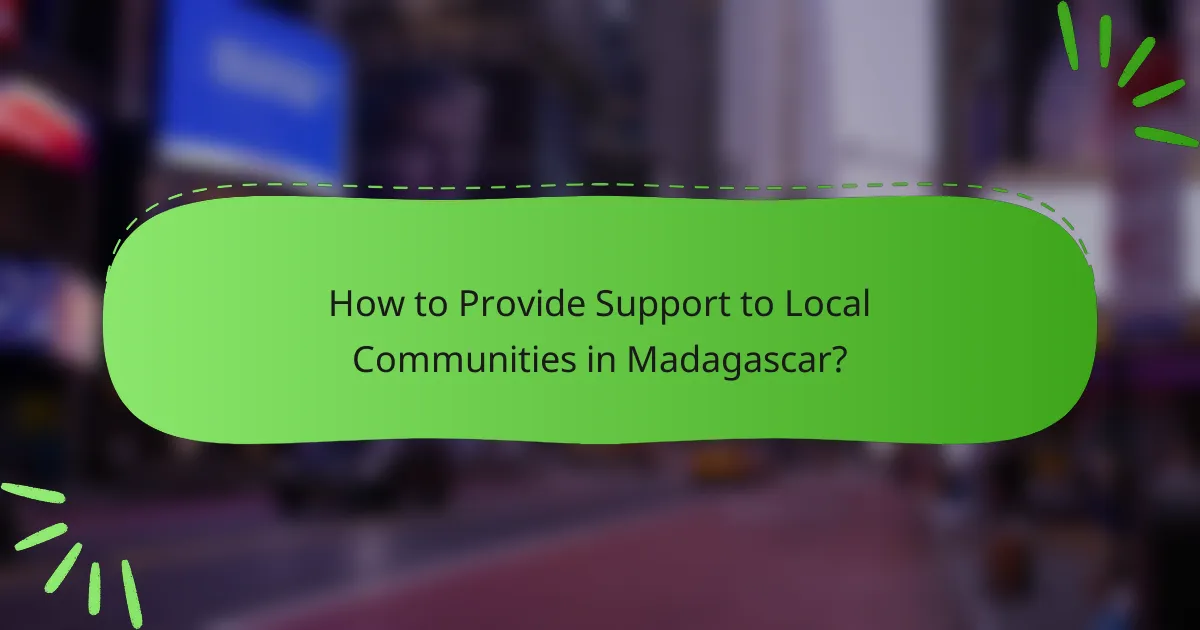
How to Provide Support to Local Communities in Madagascar?
Supporting local communities in Madagascar involves contributing resources, time, and expertise to enhance their well-being. Engaging with these communities can take various forms, including financial donations, sustainable investments, and partnerships with local leaders.
Donate to local charities
Donating to local charities is a direct way to provide support to communities in Madagascar. Many organizations focus on education, healthcare, and environmental conservation, ensuring that your contributions address pressing needs.
Consider researching charities such as the Madagascar Foundation or SEED Madagascar, which have established programs and transparent operations. Donations can range from small amounts to larger contributions, depending on your capacity and the specific projects you wish to support.
Invest in sustainable tourism initiatives
Investing in sustainable tourism initiatives helps create jobs and promote environmental stewardship in Madagascar. This approach not only benefits local economies but also preserves the unique biodiversity of the region.
Look for eco-friendly lodges or tour operators that prioritize community engagement and conservation. Your investment can support infrastructure, training, and marketing efforts that empower local residents while attracting responsible travelers.
Collaborate with local leaders
Collaborating with local leaders is essential for effective community support in Madagascar. Engaging with those who understand the cultural and social dynamics ensures that your efforts are relevant and beneficial.
Establishing partnerships can involve attending community meetings, listening to local needs, and co-developing projects. This collaborative approach fosters trust and increases the likelihood of sustainable outcomes, as initiatives are more likely to succeed when they align with community priorities.
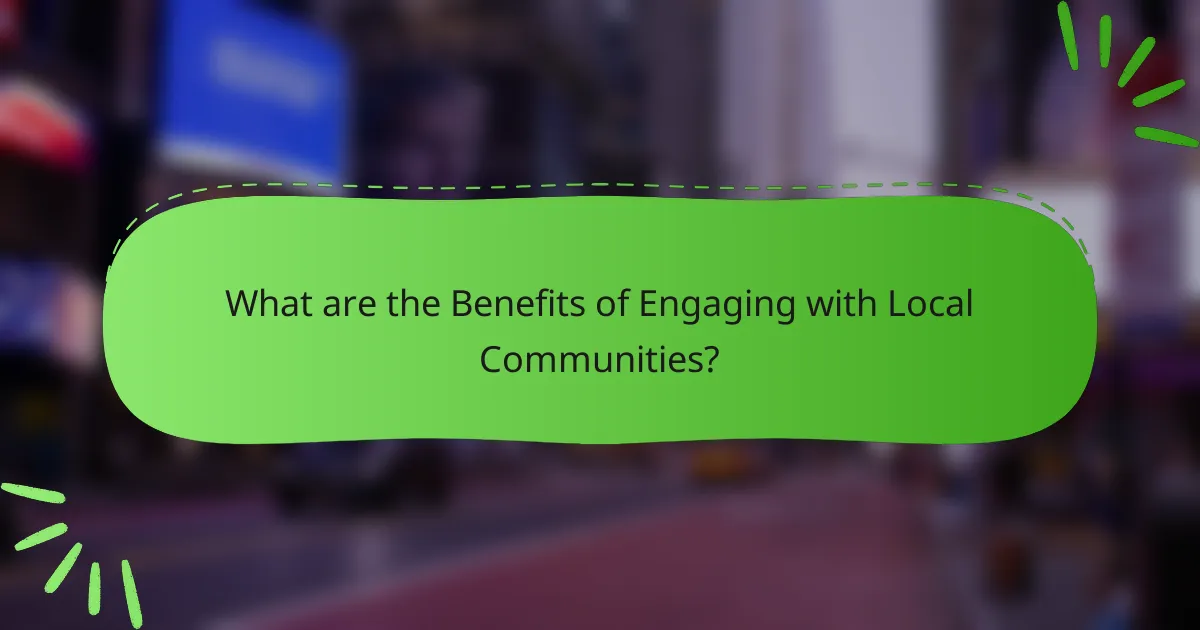
What are the Benefits of Engaging with Local Communities?
Engaging with local communities in Madagascar offers numerous benefits, including fostering relationships, boosting local economies, and enhancing resilience against challenges. These interactions create a supportive environment that promotes cultural exchange and sustainable development.
Strengthened cultural ties
Engaging with local communities helps preserve and strengthen cultural ties by promoting understanding and appreciation of local traditions. When individuals participate in community events or support local artisans, they contribute to the continuation of cultural practices and heritage.
For example, participating in traditional festivals or workshops can deepen connections with local customs and languages. This not only enriches personal experiences but also encourages locals to share their knowledge and skills, fostering mutual respect and collaboration.
Enhanced local economies
Local community engagement can significantly boost local economies by supporting small businesses and creating job opportunities. When visitors purchase goods or services from local vendors, they help circulate money within the community, leading to economic growth.
Consider participating in community-supported agriculture (CSA) programs or buying crafts directly from artisans. Such actions not only provide financial support but also encourage sustainable practices that benefit the environment and the community.
Improved community resilience
Engaging with local communities enhances their resilience by building networks of support and resources. When community members collaborate on projects, they develop skills and strategies to address challenges such as climate change or economic instability.
For instance, participating in local initiatives focused on environmental conservation can empower communities to implement sustainable practices. This collaborative approach not only strengthens the community but also fosters a sense of ownership and responsibility among its members.

What Criteria Should You Consider When Choosing Community Engagement Activities?
When selecting community engagement activities in Madagascar, consider alignment with local needs, the ability to measure impact, and long-term sustainability. These criteria ensure that your efforts are relevant, effective, and beneficial for the community over time.
Alignment with local needs
Understanding the specific needs of the local community is crucial for effective engagement. Conduct surveys or host discussions to gather insights on what the community prioritizes, such as education, healthcare, or environmental conservation. Tailoring activities to these needs increases participation and support.
For example, if a community expresses a desire for improved educational resources, consider organizing workshops or providing materials that address this gap. Engaging with local leaders can also help identify pressing issues and foster trust.
Impact measurement
Measuring the impact of community engagement activities is essential to assess their effectiveness. Establish clear metrics before starting, such as participant numbers, skill improvements, or community feedback. Regularly evaluate these metrics to understand what works and what needs adjustment.
Utilizing tools like surveys or interviews can provide qualitative and quantitative data on the impact of your initiatives. For instance, tracking the number of students benefiting from educational programs can help demonstrate success and attract further support.
Long-term sustainability
Ensuring the long-term sustainability of community engagement activities is vital for lasting impact. Consider how the community can maintain and build upon the initiatives after your involvement ends. This might involve training local leaders or establishing partnerships with local organizations.
For example, if you implement a health program, train local health workers to continue the services. This approach not only empowers the community but also fosters a sense of ownership, increasing the likelihood that initiatives will endure over time.
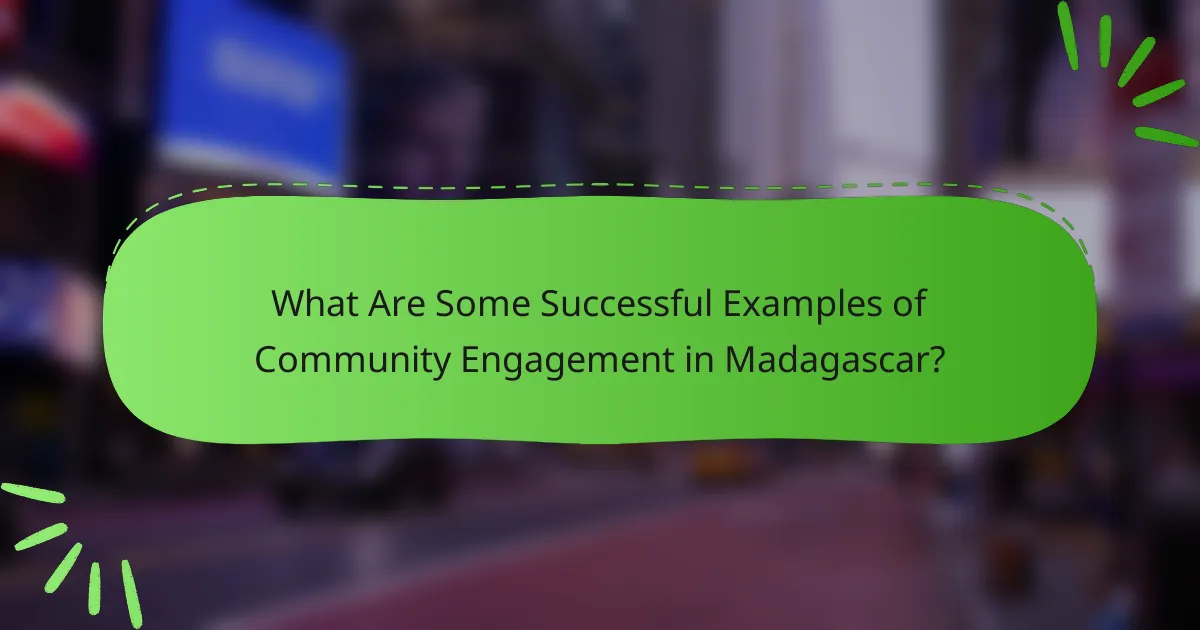
What Are Some Successful Examples of Community Engagement in Madagascar?
Successful community engagement in Madagascar often involves collaborative projects that empower local residents while respecting their cultural practices. Initiatives range from conservation efforts to educational programs, fostering a sense of ownership and responsibility among community members.
Community-Based Conservation Initiatives
Community-based conservation initiatives in Madagascar focus on protecting the unique biodiversity of the region while involving local populations. These programs often include training locals in sustainable practices and providing them with the tools to manage natural resources effectively.
For instance, the establishment of community-managed protected areas has led to increased wildlife populations and improved livelihoods for residents. By engaging locals in conservation efforts, these initiatives help to balance ecological preservation with economic development.
Educational Programs and Workshops
Educational programs and workshops play a crucial role in community engagement by enhancing local knowledge and skills. These initiatives often cover topics such as health, agriculture, and environmental stewardship, tailored to the specific needs of the community.
For example, workshops on sustainable farming techniques have empowered farmers to increase crop yields while minimizing environmental impact. Collaborating with local schools to integrate cultural education into the curriculum also strengthens community ties and promotes pride in local heritage.
Microfinance and Economic Support
Microfinance initiatives provide essential economic support to communities in Madagascar, enabling residents to start small businesses and improve their financial stability. By offering low-interest loans and financial literacy training, these programs help individuals gain independence and contribute to local economies.
Successful examples include cooperatives that pool resources for collective purchasing and selling, which can lead to better market access and increased profits. It is crucial to ensure that these financial programs are culturally sensitive and accessible to all community members.






